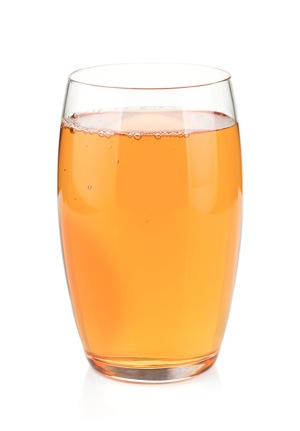
You're eating healthy by opting for fruit juice and fruit smoothies over soda, right? Wrong, unfortunately. These more natural alternatives are still loaded with excess sugar and high in fructose, creating largely the same health risks as drinking sugary sodas. That Coke and Pepsi have bought dozens of fruit juice and smoothie brands is testament to the dubious health claims of these products. When studies linking sodas with obesity and diabetes hit the media, these companies began touting fruit-based beverages as an alternative.
Fruit juice not the way to meet daily produce requirements
Bottled fruit juice and smoothie sell themselves as a way to meet your daily requirements for fruit. But these drinks do not fill you up the way eating a whole piece of fruit does, and they bombard your bloodstream with more sugar than the human body was meant to handle. A smoothie can have the same amount of sugar as a large soda. It doesn't matter if the sugar is "natural" — the impacts are deleterious regardless the source. Ongoing studies on fruit juices and smoothies show they cause the same problems with weight gain and diabetes as sodas.
Fruit sugar linked with modern health diseases
High intake of fructose has been linked with weight gain, high blood pressure, cardiovascular disease, elevated triglycerides and LDL, and type 2 diabetes. One study showed subjects who consumed high levels of fructose over 10 weeks developed new fat cells around their organs and had problems assimilating nutrients. Subjects given glucose instead of fructose did not suffer the same consequences. This is because the body metabolizes glucose differently and with less burden to the liver. Also, glucose is utilized by the body more rapidly while fructose is converted to fatty acids for storage.
If your only fructose came from whole fruits and vegetables, you would consume about 15 grams a day. You would also receive fiber, minerals, enzymes, and healthful phytochemicals — nutritionists recommend 28 to 35 grams a day of fiber. Unfortunately, the average teen today consumes more than 70 grams of fructose a day through fructose-sweetened drinks. Research shows those who drink fruit juice two or more times a week are almost 30 percent more likely to develop diabetes than those who don't consume it. This is not far behind the 40 percent higher risk for soda drinkers.
Smoothies are slightly better because they also include the fiber, however they are still high, sometimes to a staggering degree, in calories and grams of sugar. Also, experts say that because smoothies don't need to be chewed, the brain doesn't receive signals that you've eaten. Studies show chewing leads to eating fewer calories.
Safely including fructose in your diet
This doesn't mean you have to give up fruit completely, you just have to be sensible with your fruit intake. Skip the juiced and processed fruits and eat whole fruits instead, chewing thoroughly. If you love your smoothies, try vegetable smoothies that use a modest amount of fruit to make them more palatable.



Latest from the Blog
The Death of Red Dye #3
January 15, 2025What Is Red Dye No. 3? Red Dye No. 3, or Erythrosine, is a synthetic food color derived from coal tar. It was first approved by the FDA in the 1950s and quickly became one of the most popular artificial colors in food and cosmetics. Red Dye No. 3 was used in everything from candies, […] Read more
Latest from the Blog
Do You Know What Is In Your Protein Powder?
What’s Really in Your Protein Powder? Understanding the Risks Protein powders are a staple in many health-conscious diets, from athletes seeking muscle recovery to those simply aiming to boost their daily protein intake. With a wide variety of options available, choosing the right one can feel overwhelming. However, recent findings have raised concerns about what’s […] Read more